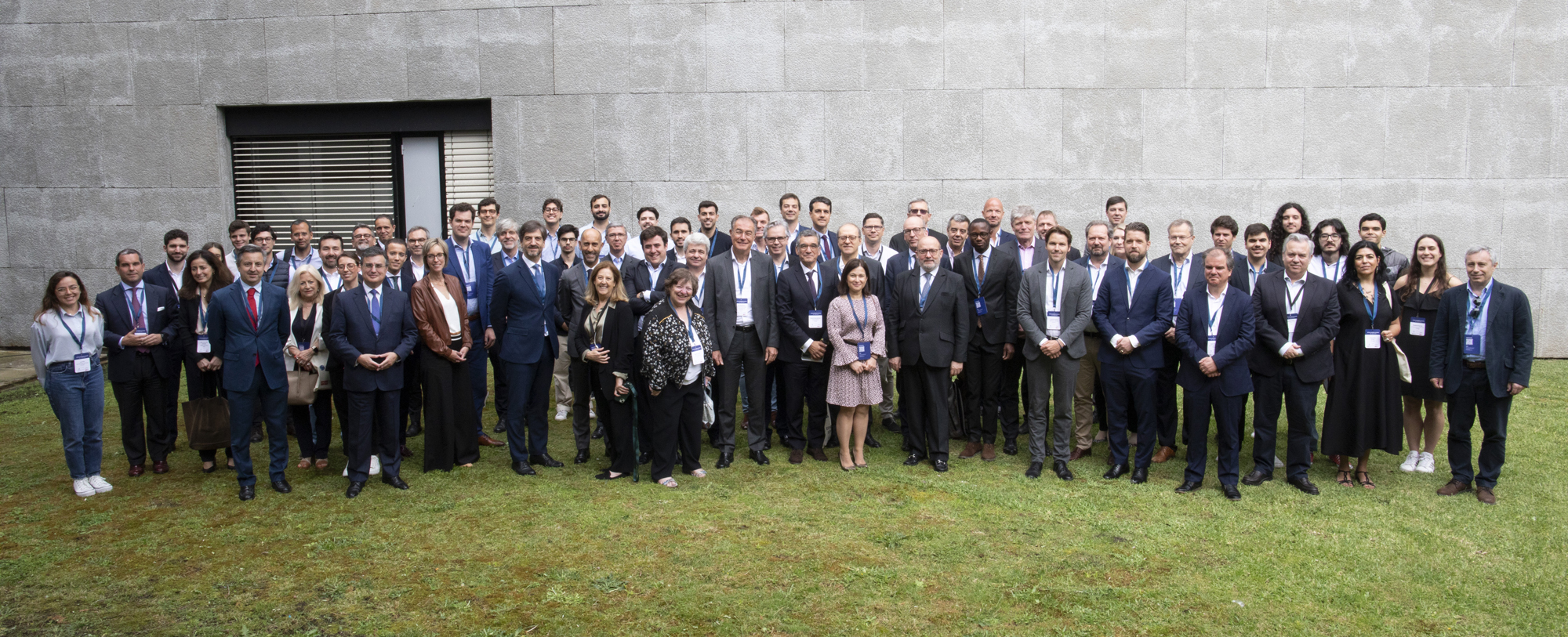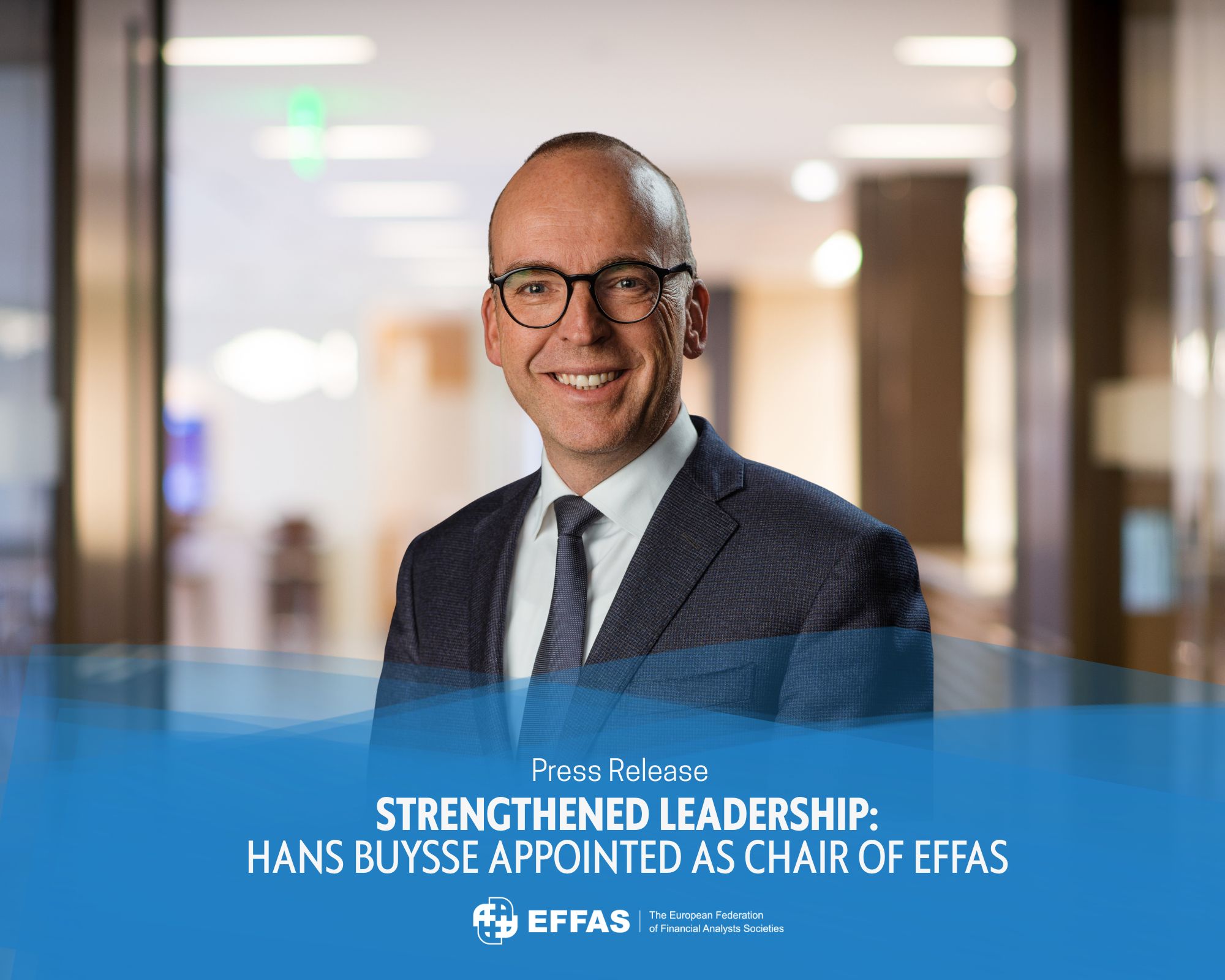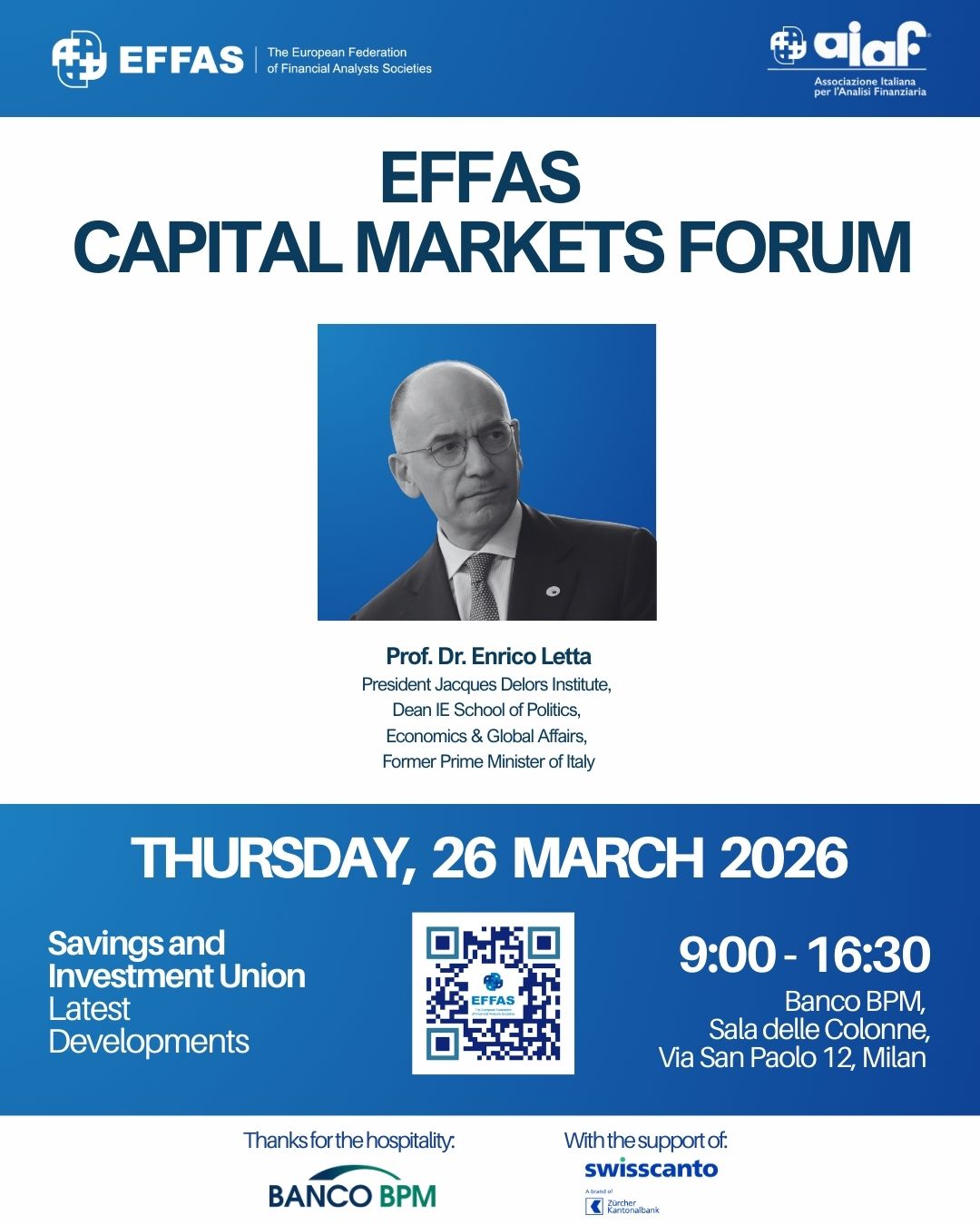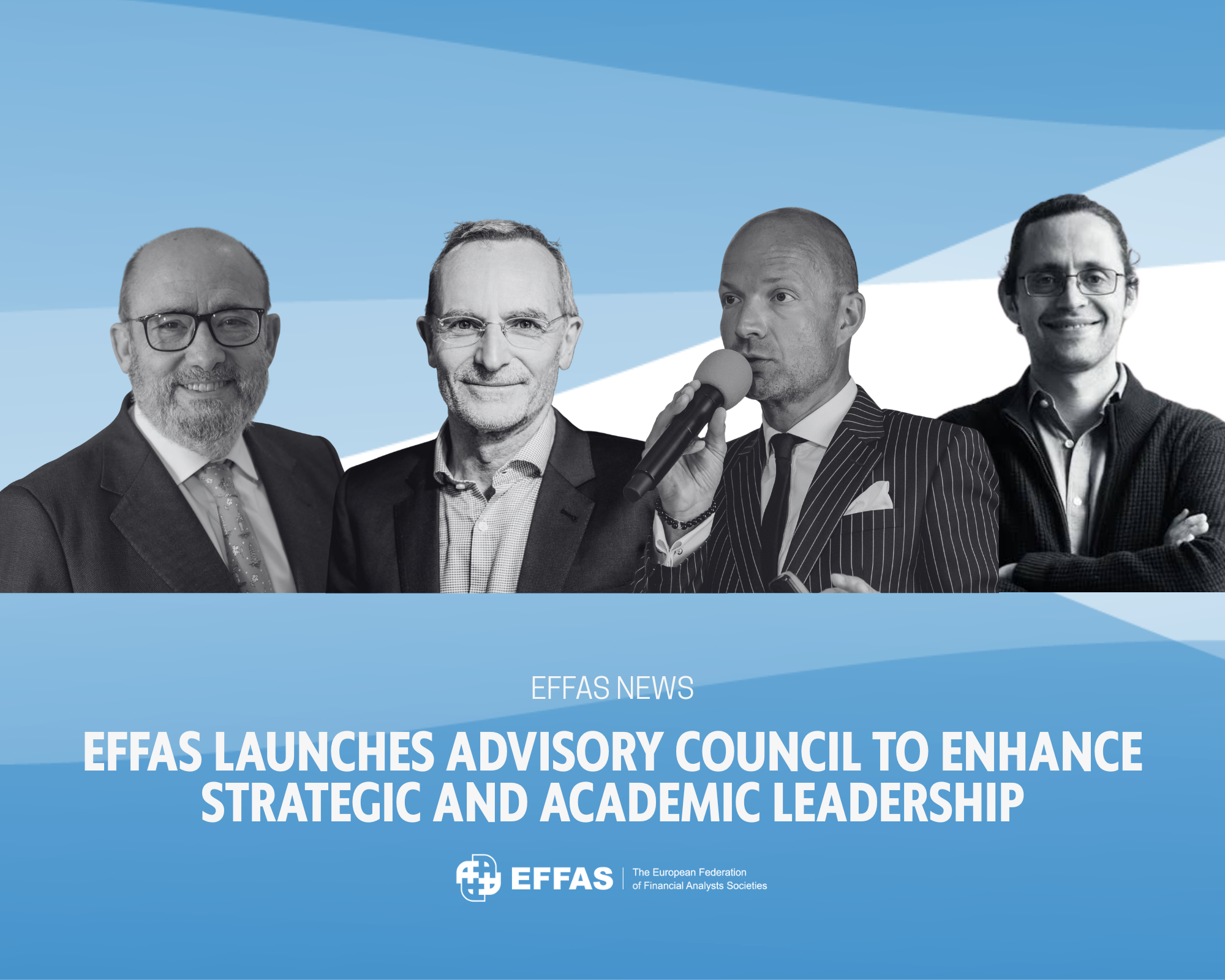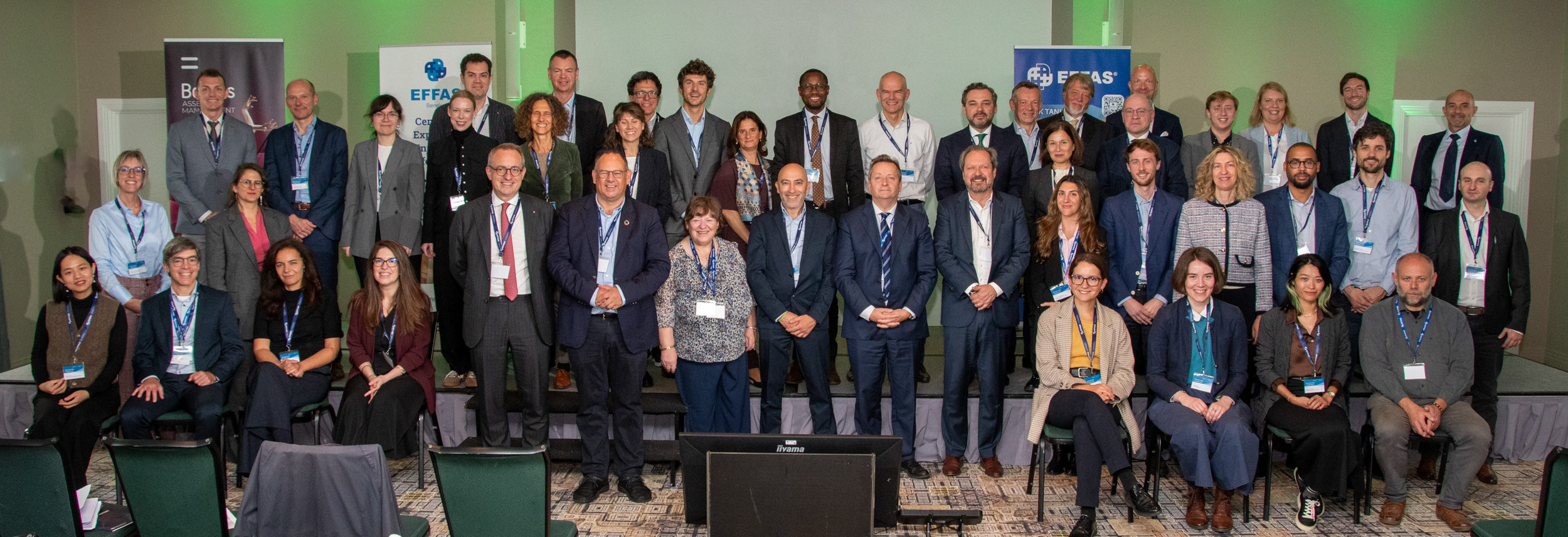Porto, June 20-21, 2024. In a world where Artificial Intelligence, Digital Assets, and Digital Money are quicky winning relevance in the global agenda, being informed of the latest developments and understanding the challenges and opportunities they present are key. Gaining the knowledge and proper training to capitalize on the opportunities that these challenges put to companies, investors and the market is crucial. This is one of the main conclusions reached at the EFFAS Summer School organized by EFFAS and APAF, the Association of Financial Analysts in Portugal.
The EFFAS Summer School united over 30 speakers and panellists from different fields and over 80 financial professionals from around Europe with 12 nationalities represented in Porto.
The day began with a welcome speech from Dr. Oscar Afonso, Dean of the FEP – Faculdade de Economia do Porto, conference host. Dr. Jesús López Zaballos, Chair of EFFAS reviewed the history of the association and highlighted its contribution to the financial world. “EFFAS has not only been instrumental in communicating the needs of capital market investment professionals to companies but has also provided practical advice in the form of key performance indicators and interactive data formats.”

Helder Rosalino, Member of the Board of Directors at Banco de Portugal, gave the opening keynote speech on the “Impact of AI on the Financial Industry” and emphasized that: “…with AI and working together — regulators, financial institutions, and technology experts —can create a financial ecosystem that is more resilient, inclusive, and innovative.”
The panel discussing the keynote, moderated by EFFAS Board Member Hans Buysse, brought together the additional knowledge of José Miguel Almeida executive board member at CMVM, the Portuguese Securities Markets commission, Manuel Gallardo Tirado Director of Data Analytics and Artificial Intelligence CoE in the Oesía Group, and Emily Prince, Group Head of Analytics at LSEG. Their discussion took a detailed look at topics including: Does Artificial Intelligence limit itself to machine learning (learn predict (think) and generative AI (create), or is it also involved in decision making and acting. What are the dangers here? What are the main false expectations and limitations of LLMs? What are the current and future challenges for AI in financial services? Are the supervisors prepared to supervise a financial market with AI operators? Is AI a clear and present danger?
Eduardo Monteiro, Board Member at BPI GA, was the second keynote speaker of the day addressing participants with the theme: Are humans going to lose control in Managing Assets?
The panel then brought together relevant professionals in their field Jorge Sousa Teixeira, CEO at BPI Asset Management, Romualdo Trancho, Director BD for Iberia at Allianz Global Investors, Oscar Esteban Navarro, Head of Sales Iberia at Fidelity and Mário Pires, Head of Portugal at Schroders and panel moderator Manuel Puerta da Costa, EFFAS Board Member & Treasurer, APAF.
They felt that though Artificial, or should we say, Augmented Intelligence focuses on better and quicker treatment of data providing more time for human invention, it plays a role in decision making and acting, leading to low probability but high impact risks wherever it is used. Governance and control are and will remain of the highest importance.

Additionally, though AI performs complex tasks faster and cheaper, improves productivity and comprehension, may enhance creativity and future decision making, as of today it remains focused on pattern recognition and very little creation. Artificial Intelligence is the result of software algorithms with statistics, probabilities and huge computer power, so it does not replace human thinking yet… A new HR skill set has been replacing the old one at the Asset Management companies as the technological edge becomes pivotal in this industry. In his concluding remarks, Mr. Manuel Puerta da Costa said that early adoption of AI would squeeze medium sized asset Managers even further turning them into easy prey for the largest ones.
Valentin Lazea, Chief Economist at Bank National Romania continued the conference by delivering the third keynote address on “The Role of Digital Money and Digital Assets in the Future” where he highlighted the transformative potential of digital money and assets, emphasizing the impending implementation of the Markets in Crypto-Assets (MiCA) regulation and its implications for the financial sector. Mr. Valentin Lazea, Chief Economist at Bank National Romanian said ”Blockchain is an important technology, which will be used exponentially. Crypto-assets are guaranteed by no one, so they should not be taken for money; MiCA is an area where Europe has a lead.”
Following the keynote was a panel discussion featuring Roger Peeters from pfp Advisory GmbH, Hendrik König, Head of Digital Assets Office at Bankhaus Metzler, and Pablo Corredoyra Alcaraz, Senior Associate at FinReg360. The session was moderated by Thorsten Müller, EFFAS Board Member & DVFA Chair.
The panellists discussed the future of crypto-assets and blockchain technology within the realms of geopolitics, infrastructure, and regulation. They highlighted global regulatory efforts to curb criminal use and compared the current blockchain landscape to the early internet, predicting significant future developments. The panel urged major financial institutions to invest in blockchain to capitalize on its potential and adapt to the evolving regulatory landscape.
Mr. Roger Peeters remarked, “So far, digital assets have not played a significant role in asset allocation, but the development is very dynamic. Since, in contrast to equities or property, for example, there is no underlying intrinsic value, a lot will depend on investor confidence.” Additionally, Mr. Thorsten Müller highlighted, ” Crypto-Assets namely Bitcoin and CBDC will be complementary to traditional currencies. But will not take over. “

The fourth keynote featured Friedrich Mostboeck, Head of Research at Erste Group, President of ÖVFA, and Deputy Chair of EFFAS presenting the “Macroeconomic Outlook and Implications of the ‘Green Agenda’ in the EU.”.
Friedrich Mostboeck then moderated the panel discussing on this area featuring industry leaders: Cristina Brízido, CEO at Caixa Asset Management; Prof. Dr. Leef H. Dierks, CEFA Academic Director; and Isabel Ucha, CEO at Euronext Lisbon.

The panellists delved into the economic challenges and regulatory impacts of the EU’s Green Agenda on the Eurozone, addressing fiscal, monetary, and structural issues. They examined how financial institutions manage risks related to the green transition and the evolving role of central banks and regulators in promoting sustainable finance. Their discussion highlighted the significant influence of the Green Deal on financial markets, investment strategies, and asset management practices, particularly the integration of ESG criteria. Insights were shared on the performance of green stocks, the role of green bonds, and how stock exchanges are adapting listing requirements to support sustainable finance. The session also explored the implications for investor behaviour, portfolio adjustments by institutional investors, and the performance of thematic investment funds focused on sustainability. Mr. Friedrich Mostboeck said that from his “point of view, the ECB made the right decision with the first tentative rate cut of 0.25% after ten consecutive interest rate hikes. Given the fact that inflation in the Eurozone has fallen significantly so far, it is the first proactive, forward-looking signal to the markets.”
The EFFAS Summer School’s second day commenced with an opening keynote from Patrick de Cambourg, Chair of the EFRAG Sustainability Reporting Board. He emphasised that “The goal is to organise a second pillar of standardised corporate reporting alongside financial reporting on an equal footing and therefore to provide quality sustainability related information to capital markets and other stakeholders to avoid green or ESG washing and to foster the creation of a single harmonised and reliable data platform (both in human readable and digital formats).’’
Following the keynote, Prof. Dr. Jorge Farinha, Director of the master’s at FEP U. Porto, moderated the discussion on “What About the Listed Equity Reporting Nightmare?” The distinguished panel featured Gilles Maguet, CEO of XBRL Europe; Javier de Frutos, EFFAS CFR Chair; Bruno Miguel Silva, Country Manager at CaixaBank Portugal; and Gisela Pires, Head of Corporate Sustainability at Corticeira Amorim.
The panellists examined the complexities and costs of financial reporting for listed firms, assessing its ability to accurately portray financial health and risks. Discussion also focused on whether current reporting adequately serves analysts and investors amidst concerns over complexity. The role of XBRL standards in managing listed equity reporting complexities was emphasized, alongside discussions on standardizing ESG reporting to combat issues like green-/social-/and governance-washing. The potential impacts of AI on financial analysis and strategies for meeting stakeholder needs through digital data processing were also explored. The day’s discussions highlighted the necessity for innovation and collaboration in refining reporting practices to remain effective in today’s intricate financial landscape.
Continuing with the day’s second session was the presentation of the EFFAS European Capital Markets Yearbook 2024. Thorsten Müller, EFFAS Board Member & DVFA Chair, along with Prof. Dr. Leef Dierks, Prof. for International Capital Markets at Lübeck University for Applied Sciences and the EFFAS CEFA Academic Director presented the key findings. The yearbook highlighted significant aspects including the ongoing gap between European market potential and actual performance, comparisons of GDP versus Market Capitalization, trends in Equity Funding, IPO Activity in Europe, Total Securitization figures, and a comparative analysis of European versus US markets in billion euros annually.
The third session commenced with the keynote address “Advantages and Challenges of Applying AI to Achieve Sustainable Corporations” by Teresa Royo Luesma, Sustainability and Governance Partner at KPMG Spain.
Following the keynote, a round table discussion delved further into pertinent topics. The panel included Álvaro Cangas, ESG Leader at Marsh McLennan; Pedro Wilton, Manager at Systemic; and Daniel Ferrer, CEO of Jupiter Alpha. Their collective expertise provided insights into current trends and strategies in enhancing corporate sustainability through innovative approaches and technological advancements. The session concluded with a call for greater collaboration and innovation in leveraging AI to address sustainability challenges, emphasizing the role of interdisciplinary cooperation and strategic implementation in driving meaningful change across industries.
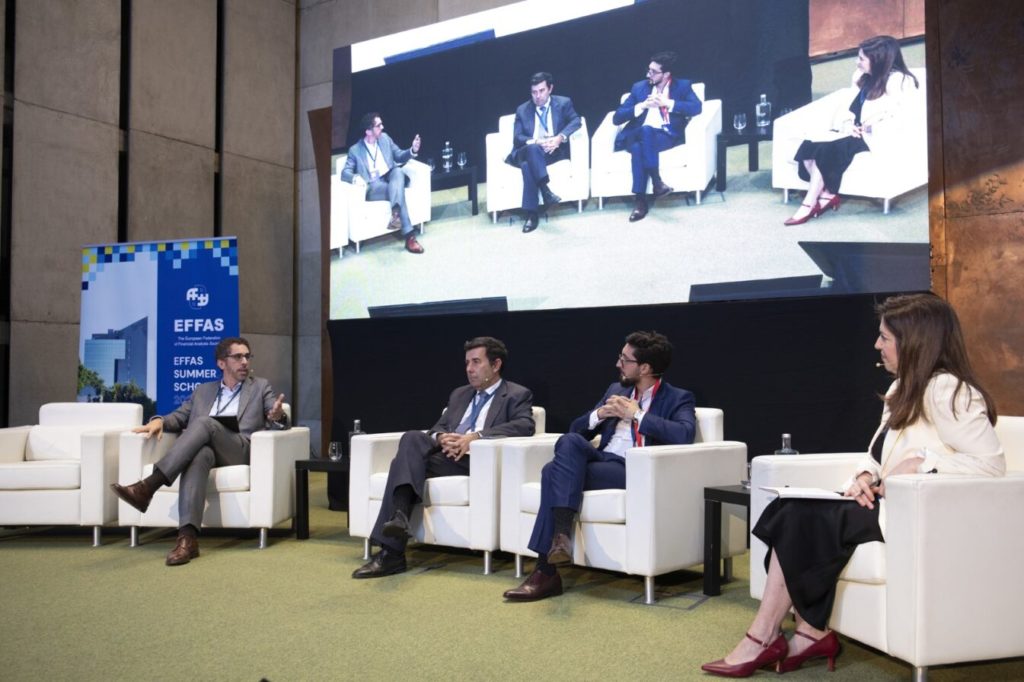
The day wrapped up with a round-up by Manuel Puerta da Costa, summarizing key insights and takeaways from the day’s discussions. The EFFAS Summer School, he concluded, continues to serve as a pivotal platform for fostering innovation and collaboration in financial education and practice. It also generates excellent networking opportunities among participants and panellists, ensuring participants are equipped to navigate and shape the future of global capital markets.
About the EFFAS Summer School
This leading annual conference offers a dynamic platform for financial professionals to engage with the latest industry trends. Renowned for their speakers and an audience of professional financial analysts, the conference facilitates a rich exchange of ideas and insights, making it an essential gathering for those at the cutting edge of financial analysis and innovation.
For any queries, please refer to:
Alvaro Wagener Diez | Marketing & Communications Manager
EFFAS e.V.
Sophienstraße 44, DE 60487 Frankfurt am Main.
a.wagener@effas.com
Phone: +49 69 98959519 – Fax: +49 69 98957529
website: www.effas.com
- About EFFAS
EFFAS is a Not-for-profit organisation set up in 1962 with 14 national member associations in Europe, representing more than 16,000 Financial analysts, Asset managers, pension fund managers, corporate finance specialists, risk managers, treasurers among many other professional profiles from the investment profession. EFFAS is a certification body for finance with over 24,400 certificate holders worldwide. https://effas.com/

